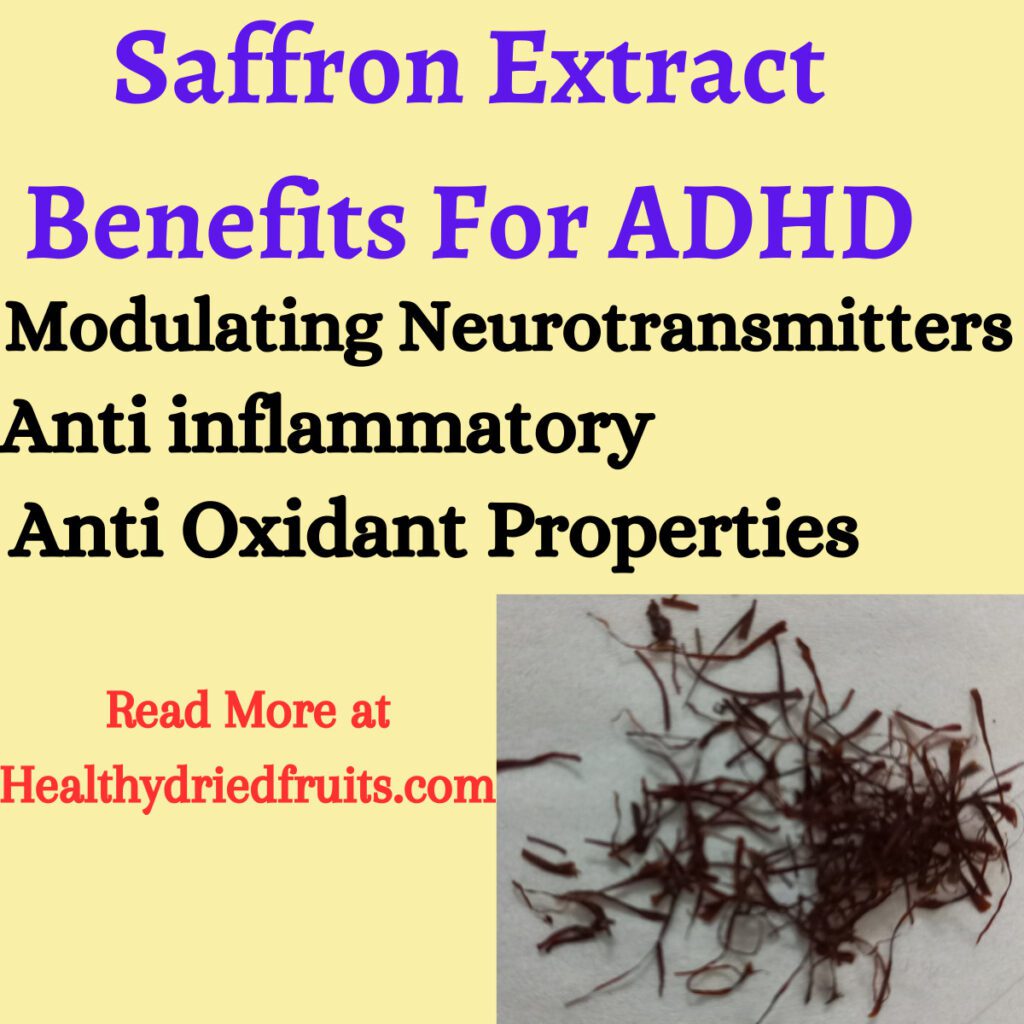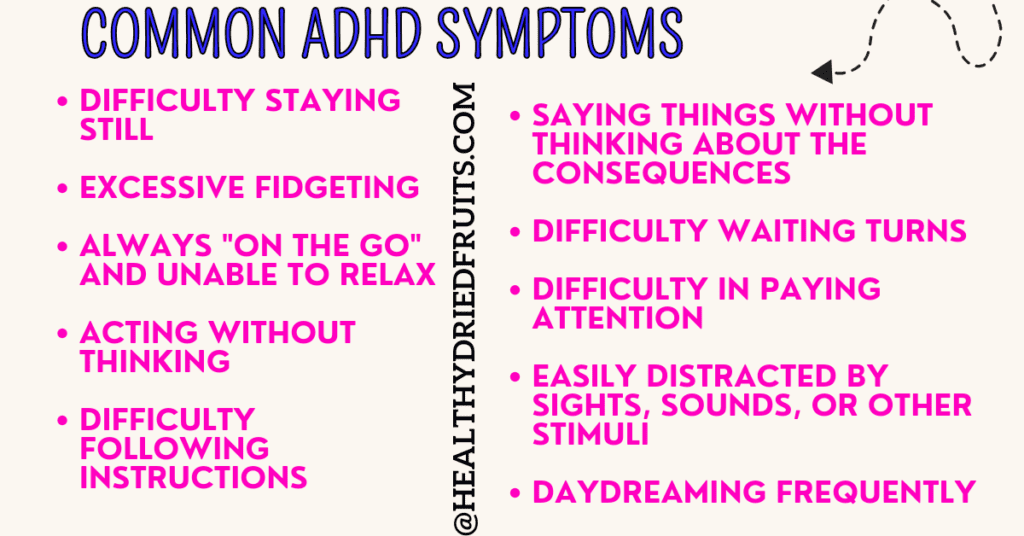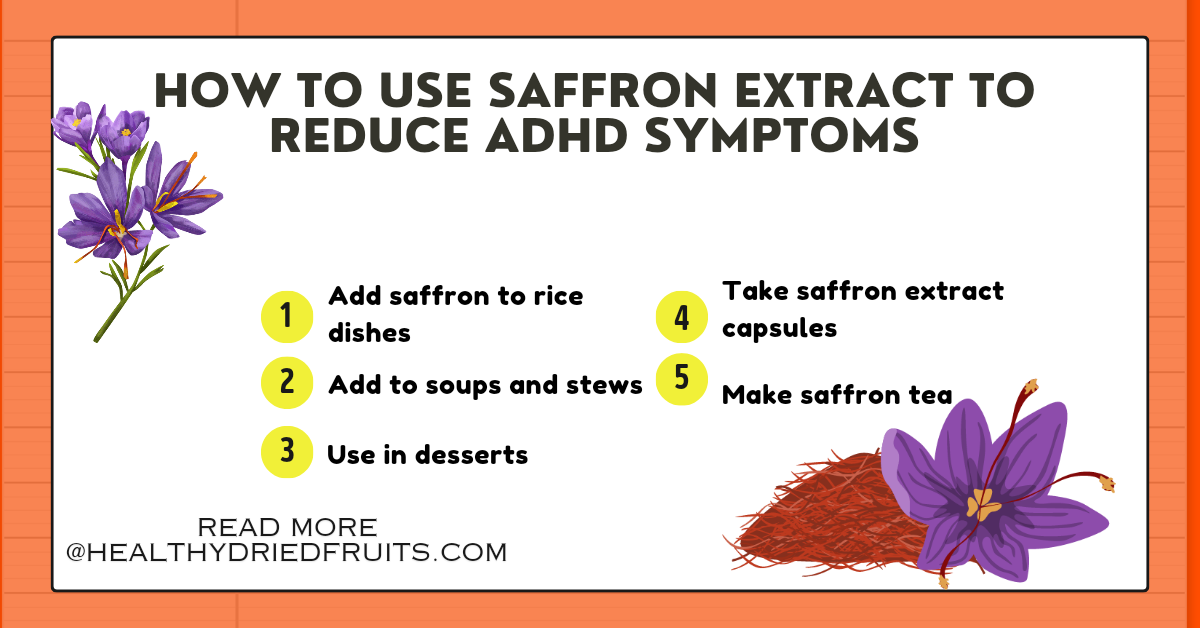Saffron is a spice known for its vibrant color and soothing aroma. It has long been used for its medicinal properties. Derived from the Crocus sativa flower, saffron extract has emerged as a promising natural remedy for various health concerns, including Attention Deficit Hyperactivity Disorder. In this blog, we will discuss saffron extract benefits for ADHD.
Recent studies have shed light on saffron’s potential to alleviate ADHD symptoms, particularly when combined with conventional treatment approaches. Let’s dig deeper into this discussion.
Let’s Learn About Saffron Extract Benefits For ADHD
Many people seek natural alternatives to manage ADHD symptoms. Here is how saffron extract reduces the symptoms of ADHD:
Modulating Neurotransmitters
ADHD is associated with imbalances in neurotransmitters, particularly dopamine and serotonin. These neurotransmitters play crucial roles in regulating attention, impulse control, and mood. Saffron extract has shown the ability to regulate these neurotransmitters, potentially contributing to its therapeutic effects in ADHD.
Studies have shown that saffron extract increases dopamine levels in the brain, which helps in improving attention, focus, and motivation. Additionally, saffron has been found to enhance serotonin levels, contributing to mood regulation and impulse control.
Anti-inflammatory and Antioxidant Properties Of Saffron
Beyond its neurotransmitter-modulating effects, saffron extract possesses anti-inflammatory and antioxidant properties that further contribute to its effectiveness in managing ADHD.
Inflammation has a link with the development of ADHD. Saffron’s anti-inflammatory properties reduce inflammation and promote neuroprotective effects.
Saffron’s antioxidant properties protect against oxidative stress, which increases in people with ADHD. Oxidative stress is a condition when antioxidants are lower in the body compared to free radicals. This can damage brain cells and contribute to neurotransmitter imbalances. Saffron’s antioxidants may help to reduce the harmful effects of inflammation.

Clinical Evidence
Emerging clinical evidence suggests saffron extract to be an effective treatment for ADHD, especially when combined with conventional treatment.
A study was conducted to compare the benefits of saffron with methylphenidate. Methylphenidate is a Central Nervous System (CNS) stimulant that is usually used to treat the symptoms of ADHD.
Results showed that the effectiveness of saffron is comparable to that of methylphenidate. Saffron was shown to be more effective for treating hyperactivity symptoms, while methylphenidate is useful for managing inattention symptoms.
How to Use Saffron for ADHD
You can incorporate saffron into your diet in various ways, both as a culinary spice and as a dietary supplement.
Culinary Uses
You can be creative while using saffron in dishes to enjoy its health benefits and flavor. Here are some ideas for using saffron:
- Add saffron to rice dishes
Saffron adds a vibrant color and a rich flavor to rice dishes, such as paella, risotto, or pilaf.
- Add it to soups and stews
Saffron can enhance the flavor of soups and stews. Adding just a pinch of saffron threads to a soup pot can infuse the entire dish with a golden hue and delicate aroma.
- Use it in desserts
Saffron can add an aroma and flavor to desserts, such as custards, ice creams, or baked goods.
Take Saffron As Dietary Supplements
To get saffron extract benefits for ADHD, you can use it in the following ways:
- Saffron extract capsules
Saffron extract capsules provide a concentrated form of saffron, allowing for precise dosing.
- Saffron tea
Steep saffron threads in hot water to create a fragrant and healthy tea.
Dosage Considerations
The recommended dosage of saffron for ADHD is still under study. However, research has used doses ranging from 15 to 30 milligrams per day. Adults can take up to 88mg per day. It is important to consult with a healthcare professional to determine the appropriate dosage for you.
Let’s review the symptoms of ADHD.
What is ADHD?
ADHD, or Attention Deficit Hyperactivity Disorder, is a common neurodevelopmental disorder that affects millions of children and adults worldwide. It is characterized by inattention, hyperactivity, and impulsivity.
Here are some common symptoms of ADHD:

Inattention
- Difficulty in paying attention or focusing on tasks
- Easily distracted by sights, sounds, or other stimuli
- Difficulty following instructions or completing tasks
- Often losing things such as keys, phone, or other belongings
- Daydreaming frequently
Hyperactivity
- Difficulty staying still or sitting quietly
- Excessive fidgeting or squirming
- Constantly running, jumping, or climbing
- Always “on the go” and unable to relax
- Difficulty engaging in quiet activities
Impulsivity
- Acting without thinking
- Saying things without thinking about the consequences
- Making careless mistakes
- Difficulty waiting turns
- Interrupting others frequently
ADHD symptoms vary from person to person and can range from mild to severe. Some people with ADHD may only experience a few symptoms, while others may experience all three core symptoms. Symptoms can also change over time and may be worse in some situations than others.
Conclusion
Several studies are available on saffron extract benefits for ADHD. This spice not only adds a delicate flavor and fragrance to your meals but also has numerous health benefits. It helps with improving your mood as well. So, add this spice to your meals and enjoy an uplifted mood, reduced ADHD symptoms, and a fantastic scent. It is available here.
FAQs
Saffron helps you concentrate better. It has active compounds that could make your brain chemicals, such as dopamine, work better. These chemicals help with paying attention and staying focused. Some early studies say that saffron improves your concentration. We still need more research to be sure about this. Eating saffron or taking it as a supplement might be a natural way to help you focus, but it might work differently for different people.
Yes, saffron extract has been shown to increase dopamine levels in the brain. Studies have shown that saffron supplements can increase dopamine levels.
Yes, saffron has been linked to calming effects on nerves. Compounds like crocin and safranal in saffron increase brain chemicals like serotonin that improve mood and reduce stress. This can potentially help in calming nerves and promoting relaxation. People often use saffron for its soothing properties, which may help in reducing feelings of anxiety or stress. While more research is needed to confirm these effects conclusively, many people use saffron as a natural way to relax and ease nervousness.
Saffron is soluble in water and it absorbs in your body quickly. But you experience the results by taking it for a few weeks.
